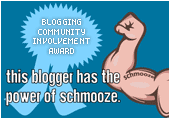It's a Girl! from Andi Buchanan
When I first received my reviewer copy of It's a Girl, I was apprehensive - as I had been when Andi first mentioned that it would be out for review this spring. I even considered asking her if I could bow out this time. Even after I found out I was pregnant again, when a healthy ultrasound image made the possibility of a daughter much less remote than it was six months ago, I was apprehensive. My relationship with my own mother is not good, and hasn't been for many years. I figured the essays in Andi's new effort might provide some insight into why that was, even if it couldn't help me figure out how to mother a girl.
In reality, the essays did exactly the opposite. While some, like Jessica Berger Gross' "Garden City," struck home as they detailed birth family dysfunction, most were about the kinds of close mother-daughter relationships I've never been sure I could duplicate. Mothers learn to let go of their preconceived notions, to see their daughters as the people they are, not the people the mothers thought they would be. Lone Star Ma said it best: "An overarching theme of this book is that, while raising sons is sometimes experienced as an adventure into the realm of 'Other' for mothers, raising daughters is often about dealing with issues of 'Self.' Some of the the essays explored the ways in which mothers looked forward to sharing with daughters things that they had enjoyed or wished they had been able to enjoy...only to find that their daughters had their own ideas about what was enjoyable and were not, in fact, reflections of their mothers' desires.... Some essays explored the ambivalence, and even dread, that some writers felt at the prospect of raising daughters - having intimate knowledge of what women face in our world and knowing that, in raising a daughter, they would be forced to confront all the things in their lives that they had run away from and stuffed down into the unconscious.
Ultimately, I realized along with Kelly H. Johnson in "Park-Bench Epiphany," "I saw that buried within my desire for a less painful past was the presumption that I would remain exactly the person I am in the present.... My childhood was the way to the here and now, to who I am today." Reading It's a Girl reminded me that raising a girl would turn out to be no different from raising my son: instead of seeing the child as tabula rasa, imprintable with my own expectations and desires, I would have to become the blank slate.
My next ultrasound comes four weeks from now. Although I'll go into the room apprehensive, it won't be a fear of learning the baby's sex. I only hope I'll be given the opportunity to get to know my child, perfectly unique as he - or she - may be.
In reality, the essays did exactly the opposite. While some, like Jessica Berger Gross' "Garden City," struck home as they detailed birth family dysfunction, most were about the kinds of close mother-daughter relationships I've never been sure I could duplicate. Mothers learn to let go of their preconceived notions, to see their daughters as the people they are, not the people the mothers thought they would be. Lone Star Ma said it best: "An overarching theme of this book is that, while raising sons is sometimes experienced as an adventure into the realm of 'Other' for mothers, raising daughters is often about dealing with issues of 'Self.' Some of the the essays explored the ways in which mothers looked forward to sharing with daughters things that they had enjoyed or wished they had been able to enjoy...only to find that their daughters had their own ideas about what was enjoyable and were not, in fact, reflections of their mothers' desires.... Some essays explored the ambivalence, and even dread, that some writers felt at the prospect of raising daughters - having intimate knowledge of what women face in our world and knowing that, in raising a daughter, they would be forced to confront all the things in their lives that they had run away from and stuffed down into the unconscious.
Ultimately, I realized along with Kelly H. Johnson in "Park-Bench Epiphany," "I saw that buried within my desire for a less painful past was the presumption that I would remain exactly the person I am in the present.... My childhood was the way to the here and now, to who I am today." Reading It's a Girl reminded me that raising a girl would turn out to be no different from raising my son: instead of seeing the child as tabula rasa, imprintable with my own expectations and desires, I would have to become the blank slate.
My next ultrasound comes four weeks from now. Although I'll go into the room apprehensive, it won't be a fear of learning the baby's sex. I only hope I'll be given the opportunity to get to know my child, perfectly unique as he - or she - may be.


